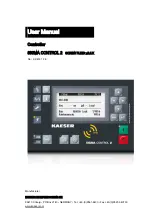
ENGLISH
47
8.6.3
GI: Setting the gain of the integral coefficient of the PI
The integral value must be increased when the system is not very elastic, that is where there is absence
of any expansion. On the contrary, in systems with deformable pipes or with delays due to considerable
distances between the electropump and the ACTIVE DRIVER, the integral value must be lowered.
To obtain satisfactory pressure regulations, you generally have to adjust both GP and GI. In
fact it is the correct agreement between these two parameters which allows the optimum
pressure regulation.
8.6.4 FS
:
Setting the maximum rotation frequency of the electropump.
The ACTIVE DRIVER allows the electropump to be fed for short periods at a frequency higher than the
rated frequency, limiting the maximum frequency sent to the electropump in the event of an excessive
increase in temperature.
The value of the set maximum frequency (FS) can therefore be reached with the motor cold and it
decreases to Fn (rated frequency) as the temperature rises in the windings.
The ACTIVE DRIVER also allows a maximum working frequency to be set that is lower than the rated
frequency Fn. In this case, in whatever regulating condition, the electropump will never be run at a
frequency higher than the set rated frequency.
The maximum FS is Fn + 20%, while the minimum FS is Fn – 20%.
FS will align automatically with Fn whenever a new Fn is set.
When increasing the supply frequency, pay attention not to exceed the Max. phase current of the
motor, otherwise there is a risk of blockage due to current overload in the output stages oF.
8.6.5
FL : Setting the minimum frequency
FL is used to set the minimum frequency at which the electropump is to be run.
The minimum value may be assumed to be 0Hz, the maximum value is 60% of Fn.
For example, if Fn=50Hz, FL may be regulated between 0Hz and 30Hz.
FL will align automatically with Fn whenever a new Fn is set.
8.6.6
Ft: Setting the low flow rate threshold
The ACTIVE DRIVER system possesses a flow sensor. Whenever the electropump is switched off a
new zero is acquired. The ACTIVE DRIVER switches off the electropump when the flow rate reading is
lower than 0 flow (ZF) + the set Ft parameter.
8.6.7
CM : Method of exchange (pre-set value 1) (excluding A.D. M/M 1.1)
When two ACTIVE DRIVER units are interconnected to work in exchange it is possible to choose
between two different strategies for alternating the switching on of the two electropumps.
CM = 0 :
The primary ACTIVE DRIVER is always the regulation leader and the secondary
ACTIVE DRIVER will be active as a booster (if Eb=2) or as a reserve (if Eb=1). If the
secondary machine remains unused for 23 hours, it becomes the leader until it has
accumulated one minute of regulation.
If during operation the leader electropump is unable to satisfy the user and the
secondary electropump is set as a booster (Eb=2), the latter will work at maximum
frequency, while the leader ACTIVE DRIVER will continue to modulate the rotation
frequency according to the user.
If the user decreases, the booster machine is switched off, while the leader machine
continues regulating.
CM = 1 :
The primary and secondary ACTIVE DRIVER alternate in being the regulation leader.
The exchange takes place each time the leader ACTIVE DRIVER goes into stand-by
mode or after 2 hours of continuous activity.
If during operation the leader electropump is unable to satisfy the user and the
secondary electropump is set as a booster (Eb=2), the latter will work at maximum
frequency, while the leader ACTIVE DRIVER will continue to modulate the rotation
frequency according to the user.
If the user decreases, the leader machine goes into stand-by and becomes the booster
(off), while the booster machine becomes the leader (and starts regulating at variable
speed).
For each of the two exchange modes, if one of the machine breaks down, the other becomes the leader
and carries out regulation at constant pressure up to its maximum available power
.
















































